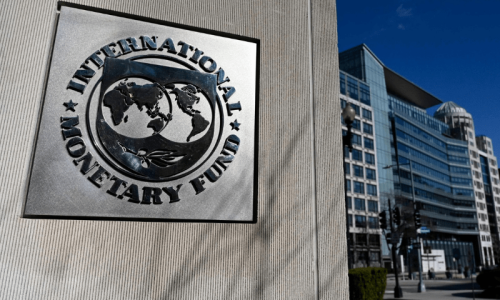WASHINGTON: When Hillary Clinton speaks, people don’t see a senator from New York. Or an ex-First Lady. They come to hear the first woman president of the United States. She always attracts a crowd, and last week at the National Press Club in Washington was no different.
Wearing a bright yellow trousersuit, Clinton did not disappoint. She devoted her nearly hour-long address to energy policy. She called for everyone to make changes. “The ball is in our court. It is up to us to act, and act soon,” she said. It was classic Clinton politics. She catapulted herself to the centre of a national issue and at the same time popped the balloon of Democratic rival Al Gore. Gore, propelled by his hit environmental film An Inconvenient Truth, is now being mentioned as a candidate in 2008. Clinton’s speech was the growl of someone looting an encroaching rival’s main ideas. “She made it clear who’s in power and who’s in Cannes,” wrote New York Times columnist Maureen Dowd afterwards.
For Clinton it was just another hurdle cleared on a long campaign road. Her bid for the Democratic presidential nomination in 2008 remains unannounced but is no secret. But can she actually win?
In July, Manhattan will see one of the most unusual parties ever held there. Rupert Murdoch, head of News Corporation and rightwing media mogul, will host a fundraising bash for Hillary Clinton, the bete noire of red-blooded American conservatives. To say this is an odd political marriage is like pointing out that Hitler and Stalin had political differences. Murdoch’s media empire includes the rightwing Fox News channel, the Clinton-hating tabloid the New York Post and neocon bible the Weekly Standard. This is what Clinton once railed against with her talk of a ‘vast rightwing conspiracy’. The announcement of the fundraiser stunned both sides of America’s ideological divide. Conservatives and liberals denounced their respective heroes. But why the great surprise?
Those who were surprised on Clinton’s behalf simply have not been paying attention. Her drift to the right was the political story of last year. She has softened her views on abortion, firmly supported US policy on Iraq, been hawkish on Iran and co-sponsored legislation with rightwing Republicans. She has been slammed by Hollywood liberals and derided by many Democrats as a sell-out. And she has already partied with Murdoch this year. Clinton has been keeping odd company for some time.
This is deliberate. Clinton’s staffers believe she must shed her liberal image if she is to win a presidential election. She needs to convince independents and soft Republicans that she is a centrist and tough on national security. Her supporters point out she has done this before. When she ran for a New York Senate seat in 2000 she pursued the same plan. It worked. And Clinton won. Yet many doubt she can repeat the trick on a national scale.
They believe Clinton will never be president. Instead she will be the author of one of the longest political suicide notes in history for a Democratic party destined to lose if it picks her. “She can move rightwards all she wants, but everyone knows what she is. She is going to get a lot of remarks about a leopard not being able to change its spots,” said Professor Shaun Bowler, a political scientist at the University of California at Riverside.
In the bright spotlight of her adult life, lived in the Arkansas governor’s mansion, the White House and now the Senate, it is difficult to pick out Clinton’s personal history. Add to that the fame of being the First Lady to Bill Clinton’s ‘Big Dog’ President, and it becomes even harder to discern Clinton as a figure in her own right. It will come as a shock to many to realise that Clinton was born a conservative. From a father in the textiles industry and a housewife mother, Clinton was born and raised in Illinois. Her first political experiences were solidly Red State. Her family was strongly Methodist, growing up in the Chicago suburb of Park Ridge. She entered politics at 16 in support of arch-conservative presidential candidate Barry Goldwater. When she joined the prestigious Wellesley College in Massachusetts she was for a time president of the College Republicans. That — obviously — did not last.
After attending a course in Washington her views changed radically and became more liberal. She joined the Democratic Party and headed off to Yale. There she met Bill. Since then her path is well known. She came into the White House on the coat-tails of her genius husband and, bowing to political realities, was forced into a role of First Lady, especially after her plans to reform healthcare ended in defeat. Then came the nightmare of Whitewater, impeachment and Monica Lewinsky. She was humiliated in the full glare of the media spotlight that constantly surrounds the most famous address in the world.
But now she has firmly carved out her own place in politics. To those who know the Clintons, this is not a remoulding of Hillary. It is simply stripping away Bill’s influence, fame and history. “I remember in the 1980s people would say: ‘If you think Bill Clinton is smart, you should meet his wife’. I heard that all the time,” said Larry Haas, a political commentator and former aide in the Clinton White House.
Less well known is the praise she earns for her warmth and humour. Clinton has a stern public image, dry and cold. Yet many who have met her say this is wrong. Karen Friedman, who once advised Clinton on media strategy, says: “When I have been in her presence she is a wonderful communicator. She has charm and a humorous nature.”
One obvious question remains: is America ready for a woman president? The honest answer is that no one knows. Some pundits claim America remains a traditional society uncomfortable with a female leader, especially during wartime. Others say that many countries, from Britain to Germany, have had female premiers and America is equally ready. They point to the success of Condoleezza Rice, Bush’s popular ex-National Security Adviser and secretary of state, as proof that Americans are happy with women in important positions. Ironically for Hillary Clinton, sex may not be the issue. That is the good news.
The greatest current threat to Clinton comes from her own side. Her stance on Iraq has proved disastrous with her supporters, even as her staff see it as necessary to win any presidential campaign.
As she spoke at the National Press Club, two women protesters began shouting anti-war slogans. “Stop the war!” they called as security hustled to remove them. One was dragged out still clinging to a banquet chair. Clinton raised her voice above the shouts, remaining firmly on-message. That sums up her Iraq strategy. She is unrepentant about supporting the war and critical only of the way it was handled. She favours a steady American troop reduction only when the Iraqi army is able to provide security. This policy is no different to Bush’s. This infuriates grassroots Democrats. At almost every public appearance, Clinton is followed by anti-war protesters.
Thus the Democratic party finds itself divided. Clinton and her legion of allies and advisers control the party machine, assuring her of frontrunner status despite her pro-war stance. Yet there is a thirst for an anti-war policy among many voters. It is a civil war between the elite and the grassroots. It will ensure that when Clinton heads off to Iowa and New Hampshire to fight her first primary campaigns, an anti-war rival will be facing her, most likely Wisconsin Senator Russ Feingold. He has even called for Bush’s impeachment.
For Clinton this is a double-edged sword. Facing anti-war opposition in her own party greatly helps her in her move to the centre. Independents will see her vilified by the anti-war left and may finally accept that she has shed her liberal baggage. On the other hand, Iraq is so polarising that it could derail her in the primaries or see her limp into a national contest, permanently wounded by her own side. “The war was a huge issue in 2004. It is going to be even bigger in 2008,” said Haas. Clinton is already facing this issue in New York where an anti-war Democrat is standing against her in this November’s Senate election.
Former union organiser Jonathan Tasini has put a political face on anti-war sentiment on her home turf. Speaking by phone last week from the small town of Geneva in upstate New York, Tasini was enthusiastic about his campaign. “In New York we don’t want a pro-war senator representing us. Her position on Iraq is no different from Bush’s, Rove’s or Dick Cheney’s,” he said.—Dawn/The Observer News Service















































Dear visitor, the comments section is undergoing an overhaul and will return soon.